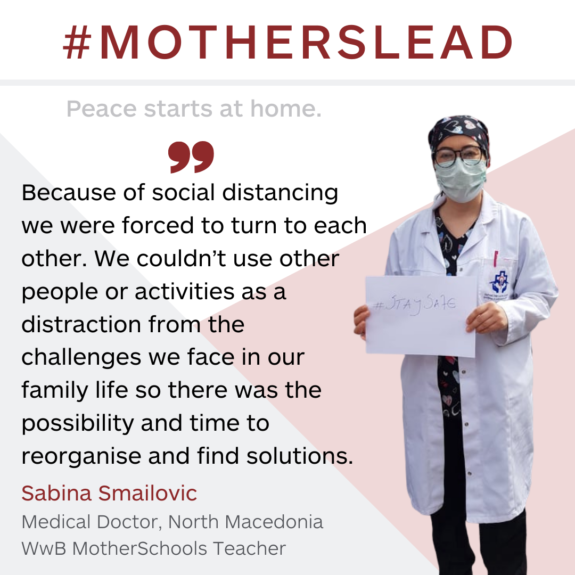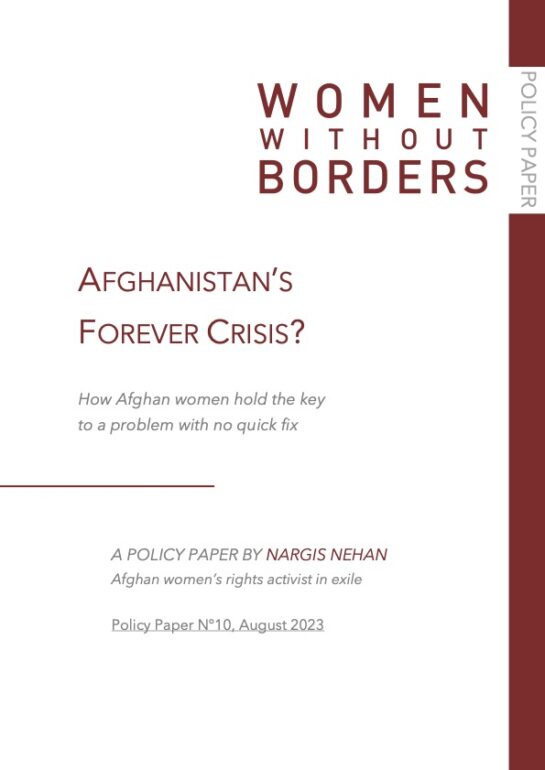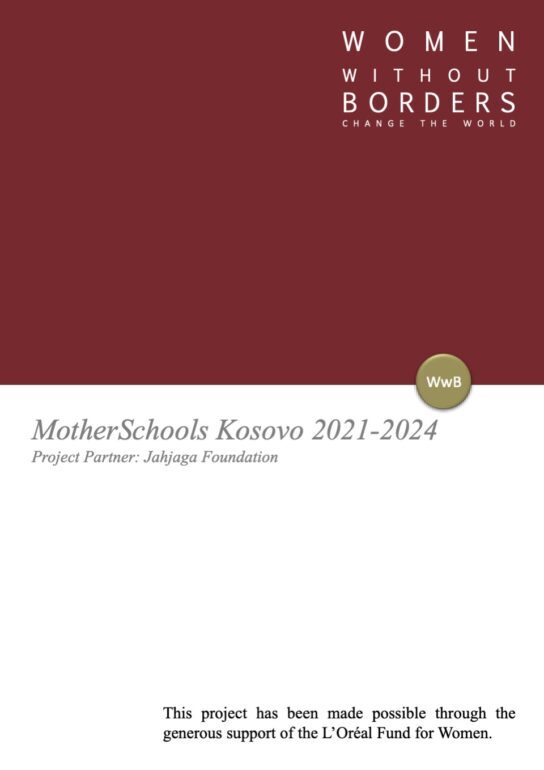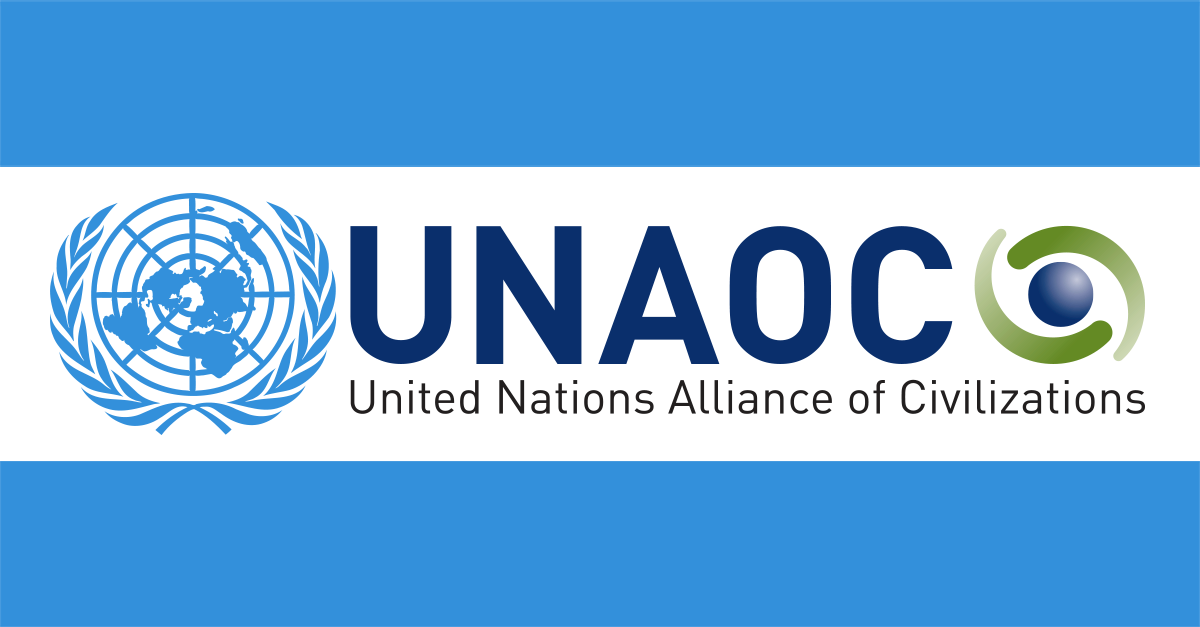#MothersLead during Covid-19! Stories of bravery and resilience from our global Women without Borders community. A campaign highlighting the courage and competence of mothers in leading their families through the new normal and beyond.
Research into the human cost of crises—ranging from natural disasters and famines to wars and epidemics—has repeatedly pointed to how severely families can be impacted. The Covid-19 pandemic has been no exception: increased pressures have exacerbated violence within homes. Countries around the world are reporting drastic surges in the number of helpline calls and reported cases of domestic and gender-based violence. To support children, women, and families more effectively, gendered response mechanisms like those outlined by UNFPA need to be folded into country crisis strategies and implemented through grassroots-level offline and online efforts. Why? Because: ‘Peace Starts at Home’! This has been the mantra of Women without Borders and our global MotherSchools Parenting for Peace movement since 2008. And this philosophy is also at the heart of our #MothersLead online campaign. Stability and communication are essential ingredients to promote peace and mitigate conflict. Mothers are often the glue that holds the family together in times of uncertainty; they are the first responders in the lives of their children. Against this background, WwB has launched the #MothersLead campaign. This online effort draws upon the organisation’s extensive network to weave the stories of mothers around the world into a global mosaic, celebrating the bravery and courage of women during these critical times. The goal of the campaign is to create a truly global platform via multimedia storytelling and activism that raises the voices of grassroots and policy-level role models who are leading their families and communities out of this global health crisis. Tod date, the campaign spans some twenty countries. The following offers a comprehensive overview of the #MothersLead campaign.
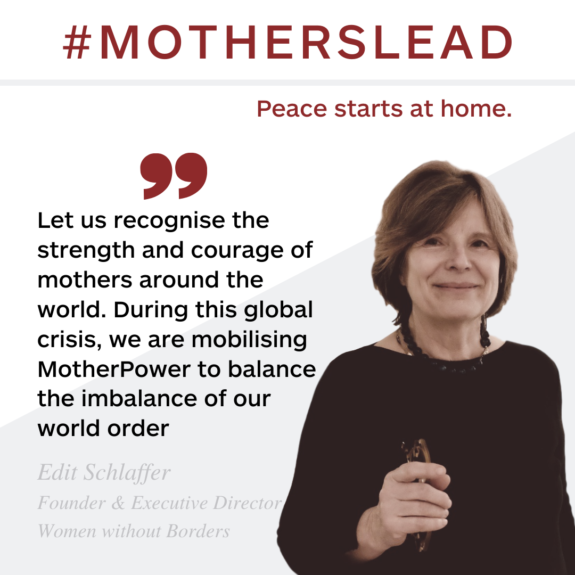
‘Let us recognise the strength and courage of mothers around the world. During this global crisis, we are mobilising Mother Power to balance the imbalance of our world order.’
– Edit Schlaffer | Founder & Executive Director of Women without Borders
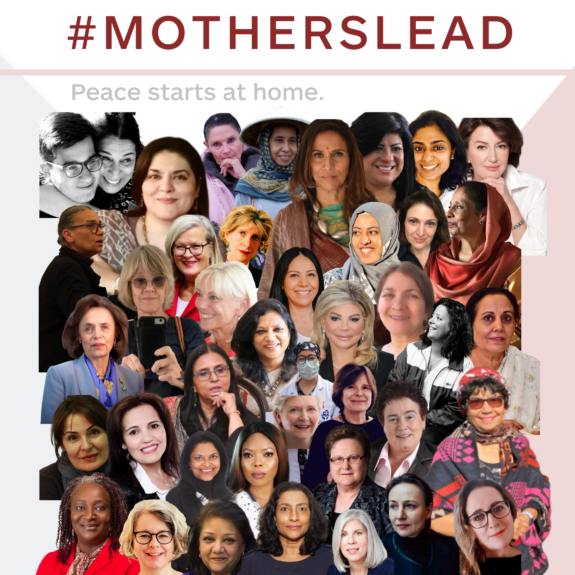
Our #MothersLead campaign has brought together powerful stories and voices from 24 countries and regions around the world, creating a mosaic of strong, resilient, courageous women & mothers who are leading their families & communities through this global crisis.
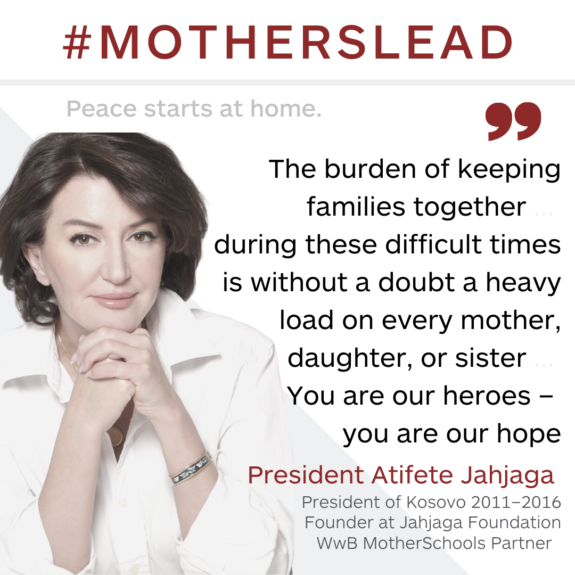
‘In this situation, along with the frontline fighters, women have been affected tremendously. The burden of keeping families together, from both the psychological and financial aspect, during these difficult times is without a doubt a heavy load on every mother, daughter, or sister. I want to thank every woman for their daily acts of selflessness and their continuous contribution during this pandemic. You are our heroes-you are our hope.’
– President Atifete Jahjaga | President of Kosovo 2011–2016, Founder at Jahjaga Foundation, WwB MotherSchools Partner
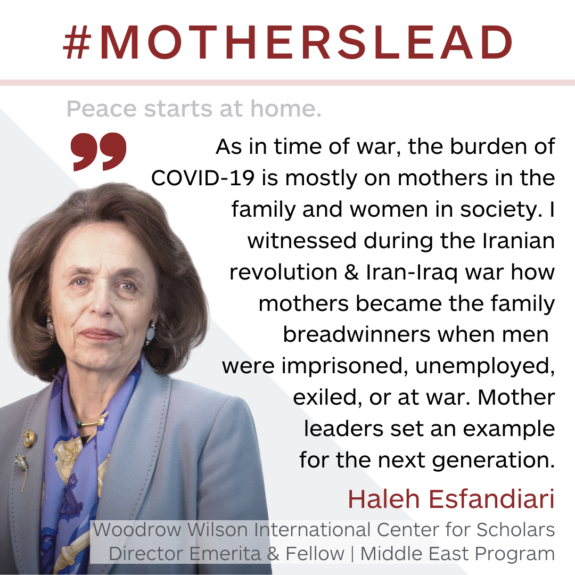
‘As a mother, grandmother, a woman activist, an academic, and a former political prisoner in Iran, I am certain that we mothers and women will prevail over this pandemic. … As in time of war, the burden of COVID-19 is mostly on mothers in the family and women in society. I witnessed during the Iranian revolution & Iran-Iraq war how mothers became the family breadwinners when men were imprisoned, unemployed, exiled, or at war. Mother leaders set an example for the next generation. … It is the mothers who have to look after the children who don’t go to school, a husband who is unemployed, or is on furlough at home, a budget that is shrinking and tensions that are rising. It is mothers who have to put up with physical and verbal violence in the confinement of their homes. Mothers provide the buffer zone between angry, frustrated fathers and restless, children and are the glue that holds the family together. … As a former political prisoner in Iran I have been asked in recent weeks whether being under quarantine is the same as being in prison. My reply is that there is no comparison. When you are a prisoner you can’t step out of your cell, your ward or the prison premises. You are at the mercy of your jailers … My thoughts are with the many women political prisoners in Iran, who were not even allowed a brief furlough to be with their children and their families, while some 85,000 prisoners held for non-political crimes were sent home due to the Corona virus. These women were denied furlough by the authorities for no other reason than meanness and spite. Some of them might become infected or even die in prison, yet they remain strong of heart and continue their quest for freedom and justice. In this difficult time, we must think of them and other women prisoners and continue to speak of them’.
– Haleh Esfandiari | Director Emerita & Fellow, Middle East Program, Woodrow Wilson International Center for Scholars, Washington, DC, USA
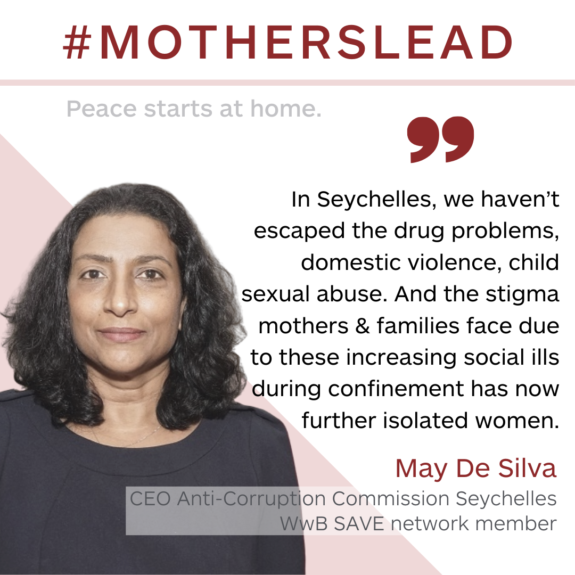
‘To all mothers without borders: I speak to you as a woman, daughter, mother, sister, and leader. In this time of the COVID-19 pandemic, we have been confined in our homes with our family and some of us with or without our children. In Seychelles, we haven’t escaped the drug problems, domestic violence, child sexual abuse. And the stigma mothers & families face due to these increasing social ills during confinement has now further isolated women. The challenge for us is the political will to change policies and procedures; the drive to change the status quo and the mobilisation of women to make that change. Women of Seychelles are strong but we need the support with strong and sustainable infrastructures to enable us to progress and protect the vulnerable women and girls in our society. Globally women are victims of those social ills and more needs to be done to address this issue. We have the highest rate of heroin usage per capita in the world. In effect we have the world’s worst heroin problem. Money laundered from sale of illicit drugs could potentially fund terrorist activities. My role as a member of the National Anti-Money Laundering and Counter Financing of Terrorism committee (AML/CFT Committee) is to ensure that we have the right laws and mechanisms in place to stop illicit financial flows. My hope is that there is a strengthened global movement of women led by Women without Borders. This organisation have been bold in speaking for the vulnerable and voiceless women across the globe. A strength in numbers and a movement of women and mothers to be taken seriously by those in leadership. Our voice matters. Our role in society matters.’
– May De Silva | CEO Anti-Corruption Commission Seychelles & original member of Sisters Against Violent Extremism (SAVE) network by Women without Borders, WwB
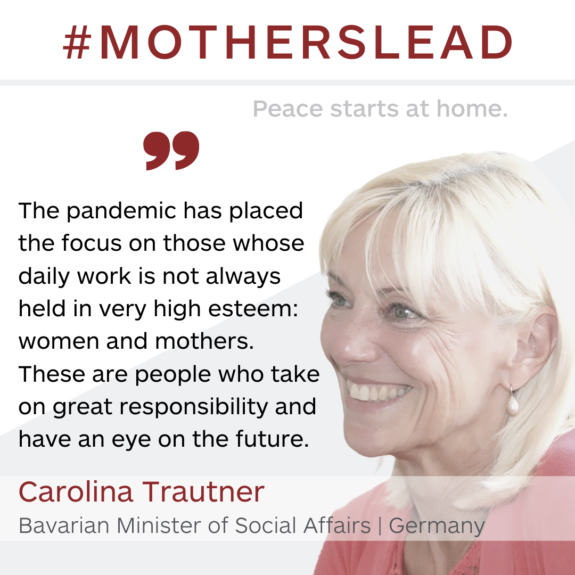
‘The pandemic has placed the focus on those whose daily work is not always held in very high esteem: women and mothers. These are people who take on great responsibility and have an eye on the future’. [For the Minister’s video message, click here]
– Carolina Trautner | Bavarian Minister of Social Affairs
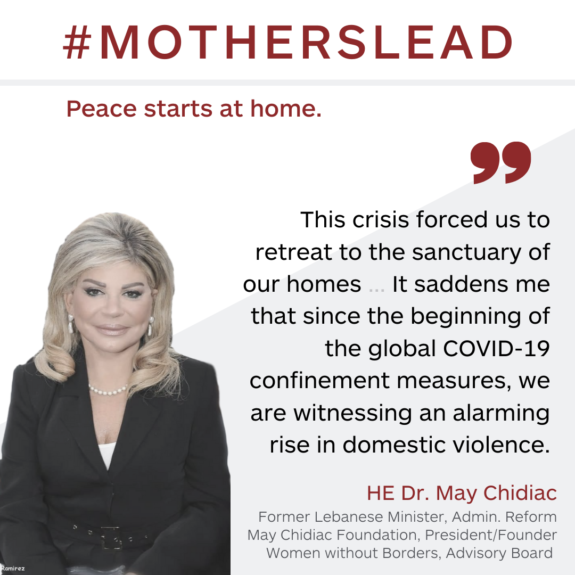
‘This crisis forced us to retreat to the sanctuary of our homes … It saddens me that since the beginning of the global COVID-19 confinement measures, we are witnessing an alarming rise in domestic violence. … In mid-February 2020, the virus reached Lebanon, today it is widespread across the country. Actually I experienced COVID-19 myself since I was contaminated after a one week trip to France. … [After] my trip to France I was tested COVID-19 positive, seen that my immunity system is relatively weak post the assassination attempt that I was subjected to back in 2005 as well as the endless number of surgeries I underwent. … It is not easy to cope with self-isolation, let alone taking care of our families. Yet, mothers have a primary responsibility to act together in preventing the outbreak of this pandemic that have shaken our global community. Prevention starts at home and you mothers are its leaders, you hold the responsibility to maintain peace and well-being in your households and I am sure you will prevail at it.’
– May Chidiac | Lebanon’s former Minister of State for Administrative Reform, President/Founder of May Chidiac Foundation (MCF), Women without Borders Advisory Board Member, Associate Professor of Science of information & Communication at Notre Dame University–Louaize
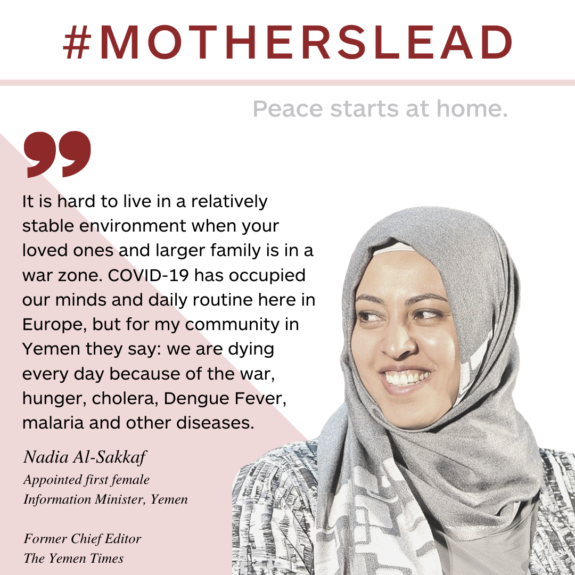
‘It is hard to live in a relatively stable environment when your loved ones and larger family is in a war zone. COVID-19 has occupied our minds and daily routine here in Europe, but for my community in Yemen they say: we are dying every day because of the war, hunger, cholera, Dengue Fever, malaria, and other diseases … Fortunately, there has been only one case of COVID-19 in Yemen and this is because of the fact that it is very hard to get into the country. It is a war zone, so no one wants to go there, and all airports except for two are closed. I had to flee my country in 2015 with my two children. Now we live temporarily in the UK, and I am not sure where we are going next. But as a mother who has conquered several life changing situations, I know I am strong enough to start all over and succeed.’
– Nadia Al-Sakkaf | first female Information Minister, Yemen; former Chief Editor, The Yemen Times
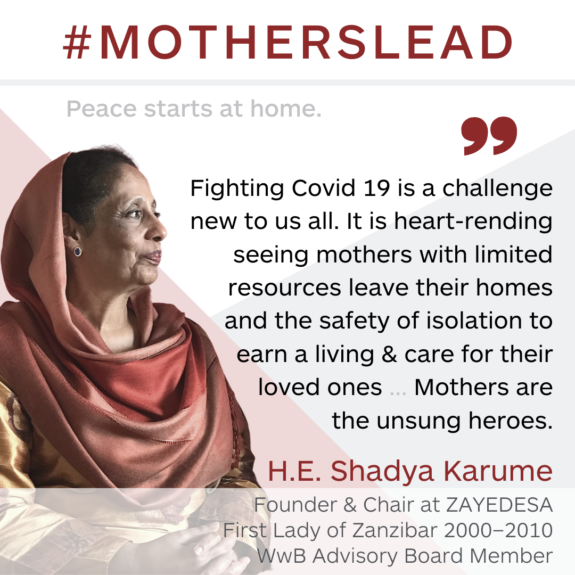
‘During this difficult time as women and mothers we feel we are not doing enough with the choices left to us in protecting our families and supporting our communities. Fighting Covid-19 is a challenge new to us all. It is heart-rending seeing mothers with limited resources leave their homes and the safety of isolation to earn a living and care for their loved ones, and we are proud to see our women heroes who have to go to work to save lives. Mothers are the unsung heroes.’
– H.E. Shadya Karume | Founder & Chair at ZAYEDESA, First Lady of Zanzibar 2000–2010, WwB Advisory Board Member
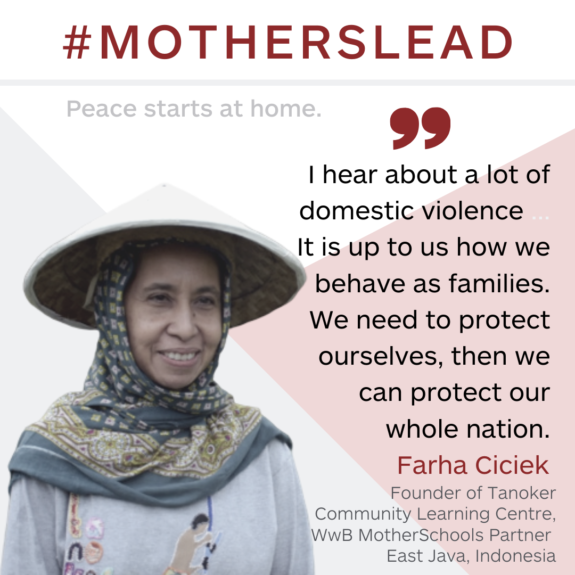
‘I hear about a lot of domestic violence, it is such a stressful time, suddenly there are no jobs, there is no money. .. Corona was teaching me that science is not everything. It is up to us how we behave as families. We need to protect ourselves, then we can protect our whole nation. This crisis brings us closer together … I use the time to pioneer new gardening techniques and we will share with the villagers this expertise to grow our own chilies and tomatoes. This is our community activism. Children who participate in the weekly reading club are welcome to swim in the pool which I have recently built with my husband. The mothers and grandmothers also join and they are all together less stressed.’
– Farha Ciciek | Founder of Tanoker Community Learning Centre in Ledokombo, Indonesia & WwB MotherSchools Partner in East Java
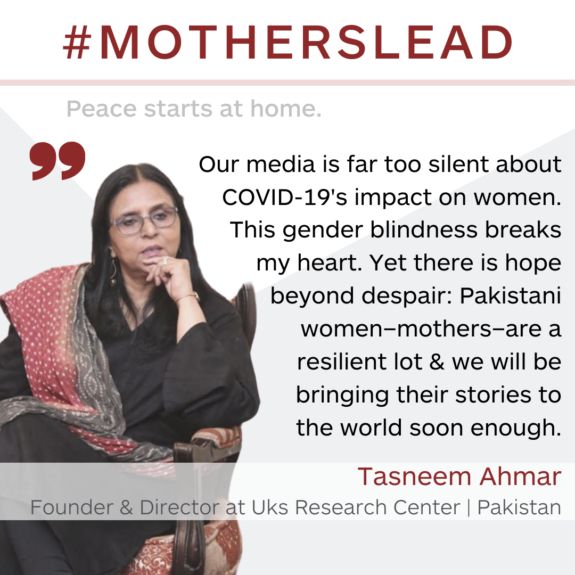
‘Our media is far too silent about COVID-19’s impact on women. This gender blindness breaks my heart. Yet there is hope beyond despair: Pakistani women–mothers–are a resilient lot & we will be bringing their stories to the world soon enough. … I live in Karachi, Pakistan’s biggest city. There are millions of regular and irregular labour, daily wage earners–male, female, and children. Most of the slums have women as the bread earner, as many men in families are either too lazy to work or addicts. Hence the women–mostly mothers–have to look for work. Many of the men resort to violence when they don’t get money for their addictions; mothers then take out their depression by beating up the children. Educational institutions are closed and there is also a dent on the educational process. The mothers are doubly burdened–as potential carriers and caregivers. For them to save themselves and others is a big challenge. When there is no money for food, masks, gloves and sanitisers are a far-fetched idea. There are a lot of efforts–both by the government and other welfare organizations–to reach out to these poorest of poor families, but it’s a huge task. … True that this pandemic is huge and the situation is still relatively new. But we have seen this happen before, though at relatively smaller scales through different situations. The 2005 earthquake was a big challenge that changed the lives of hundreds of women who before the disaster had never seen the sunlight, as they were not allowed to step outside the four walls of their homes. That was the reason that the number of deaths of female versus male was more. They were inside their homes; men were out in the open. There will be more lessons learnt from COVID 19 and hopefully a lot of positive stories will unearth once people start to share how they managed their lives during the pandemic. Already some stories are coming out, though most on domestic violence that also needs to be addressed seriously, and a lot will be needed on handling mental health issues, at many levels. This why Uks and I are trying to bring out such case studies that would help people, especially mothers, come out of despair and get messages of hope.’
– Tasneem Ahmar | Founder & Director of Uks Research Center, Pakistan
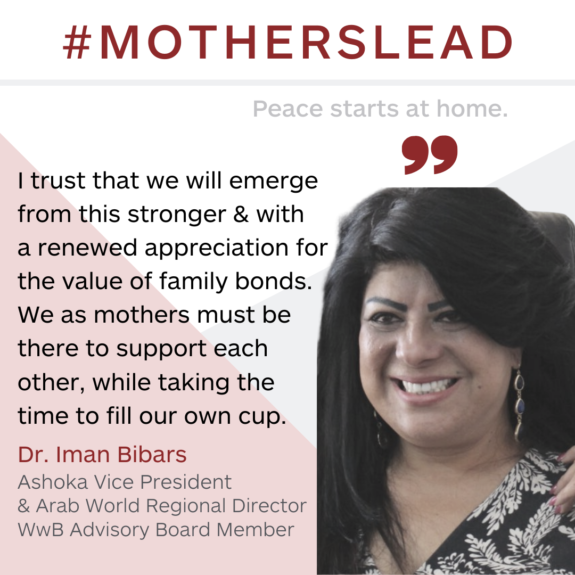
‘As a mother separated from her son, my heart goes out to all the other mothers who are separated from their children. Whether they are on the other side of the world, or quarantined a town a way, it is difficult to be away from family in this critical time. But I trust that we will emerge from this stronger and with a renewed appreciation for the value of family bonds. We as mothers must be there to support each other, while taking the time to fill our own cup. Caring for ourselves is as important as caring for others, and is as crucial as ever. … My son is currently a university student in the UK … I was able to visit him in March, and was luckily able to get a repatriation flight home in April following the Egyptian travel restrictions. Following my return I was quarantined for two weeks along with all the other passengers as a precaution. The isolation was difficult both professionally and personally, but thankfully I have a wonderful support system that was able to help me through the process, and am now able to work from my home, and greatly looking forward to seeing my son again soon. … From the professional perspective, at Ashoka it was also challenging when we first decided to begin working from home … Many of the individuals with whom we work do not have regular, consistent internet access, compounding the additional programmatic challenges. We are actively exploring solutions to these obstacles and are looking forward to resuming all of our programs as soon as possible … But necessity is truly the best catalyst of invention.’
– Dr. Iman Bibars | Ashoka Vice President, Ashoka & Arab World Regional Director, WwB Advisory Board Member, Egypt
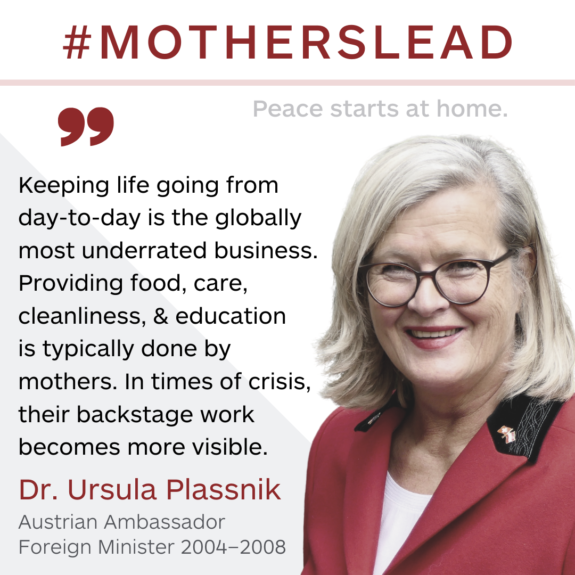
‘Keeping life going from day-to-day is the globally most underrated business. Providing food, care, cleanliness, and education is typically done by mothers. In times of crisis, their backstage work becomes more visible. So it should be more valued. Cheers to the mothers!’
– Dr. Ursula Plassnik | Austrian Ambassador to Switzerland, Austrian Foreign Minister 2004–2008
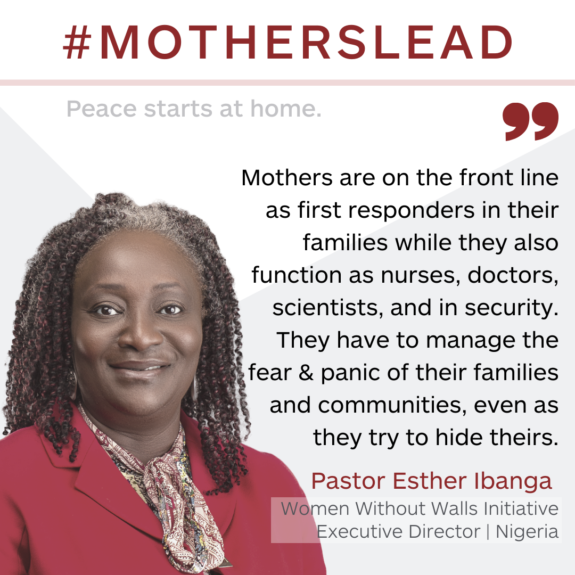
‘We are faced with an unprecedented epidemic of enormous proportion that has affected the whole world as never before in our time and generation. Mothers are on the front line as first responders in their families while they also function as nurses, doctors, scientists, and in security. They have to manage the fear & panic of their families and communities, even as they try to hide theirs. Lives have been lost, tears so deep they cannot be seen as people move around in shock wondering what has beset humanity. Burials of loved ones they cannot attend to say last respects, sick ones in hospitals they cannot visit to hold their hands and comfort them while they fight for life and the pain of loved ones dying alone. This is the time to reach down deeper into something that is greater than us all. Women without Borders gave birth to Women Without Walls and I truly believe this is the time we all become Neighbours Without Walls as we reach out to each other in love and appreciation of our shared and common humanity. We need to love God and love our neighbours as ourselves. This too shall come to pass and we shall overcome.’
– Pastor Esther Ibanga | Executive Director Women Without Walls Initiative, Jos, Nigeria
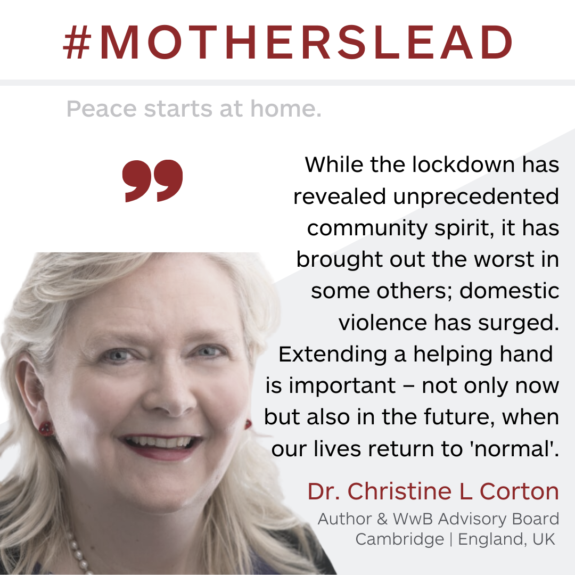
‘These rather strange times brought about by the coronavirus has inspired many women to great feats of kindness. Women are shopping for their elderly neighbours, tapping on the windows of those who are vulnerable and alone to chat from a safe distance. While the lockdown has revealed unprecedented community spirit, it has brought out the worst in some others; domestic violence has surged. Extending a helping hand is important – not only now but also in the future, when our lives return to “normal”. Here’s hoping that a sense of community is not only for abnormal times, but normal times as well.’
– Dr. Christine L Corton | from Cambridge, England, UK, is the author of ‘London Fog: The Biography’ and WwB Advisory Board Member
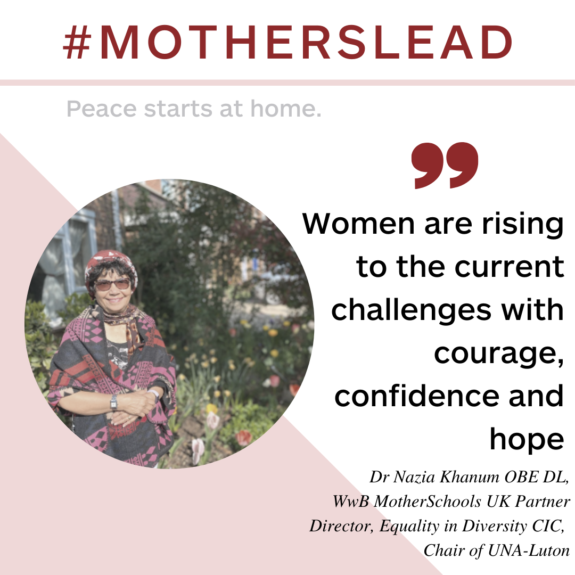
‘During the COVID-19 pandemic of 2020, women, especially mothers, are again proving themselves to be the front liners in the crisis… They are protectors of children, vulnerable adults and themselves as relationships become fraught in the lockdown. This is particularly hard for those living in small flats and on low or no income… women are rising to the current challenges with courage, confidence and hope. As an academic turned human rights activist for decades, I know how in times of adversity women can dip into their reservoirs of inner strength and wisdom to promote the wellbeing of their families, communities and society. During this global crisis, let the Women without Borders’ MotherCircles be united as one big circle around the world … I believe they will come out stronger and more confident as mothers, women and leaders.’
– Dr. Nazia Khanum OBE DL | WwB MotherSchools UK Partner; Director, Equality in Diversity CIC; Chair of UNA-Luton
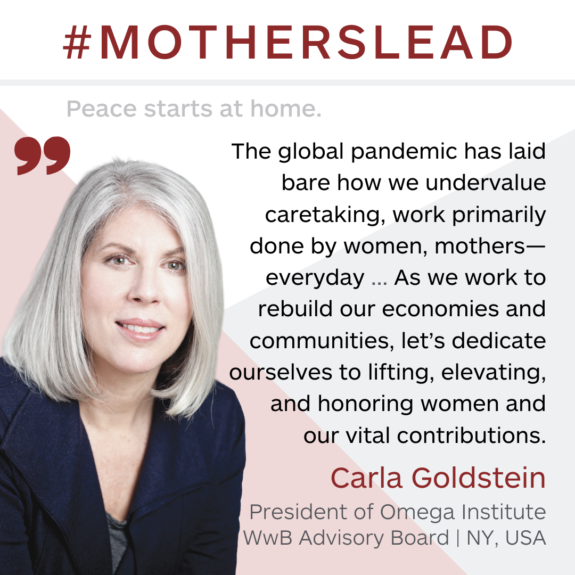
‘The faces of those who are holding things together, feeding, cleaning, comforting, sitting by the bedside of hospitalized patients without family, are often women, who are forced to straddle the underpaid work caring for their community and the unpaid work of caring for their own families. The global pandemic has laid bare how we undervalue caretaking—work primarily done by women, by mothers, everyday—who do so without the dignity of social recognition, political representation, or economic reward. And we also see in stark numbers how women, particularly women of color, bear the brunt of crisis. As we work to rebuild our economies and communities, let’s dedicate ourselves to lifting, elevating, and honoring women and our vital contributions as menders, healers, and peacemakers. The pause around the world created by the pandemic presents a unique opportunity to see the depth of our shared humanity, and to know first-hand how the well-being of every individual is deeply connected to the well-being of all living things. This should be a clarion call across borders and boundaries of all kinds, to create more mutual and caring relationships, and a more peaceful, just, and sustainable world—for everybody.’
– Carla Goldstein | President of Omega Institute, co-founder of the Omega Women’s Leadership Center, and WwB Advisory Board Member
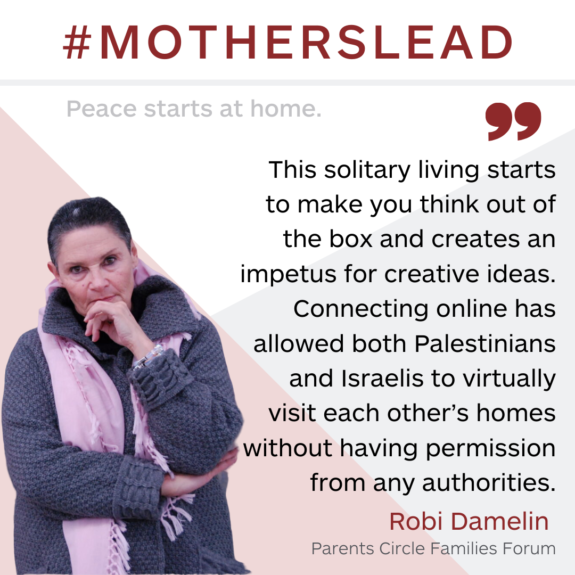
‘Dear women all over the world from all walks of life: our lives, after this terrible Corona, are more intertwined than ever. I have been in lockdown for more than two months and have come to the conclusion that this solitary living starts to make you think out of the box and creates an impetus for creative ideas. Connecting online has allowed both Palestinians and Israelis to virtually visit each other’s homes without having permission from any authorities or permits. How strange that in so many ways speaking on an internet platform also allows for better listening. One can mute and so actually hear what the other has to say, without interrupting. I am not suggesting that this is an ideal setting for dialogue, but it can be used in so many creative ways. It seems to me, that the world will never be the same, and perhaps our sense of values and gratitude will come to the fore. Sending lots of love and health to you all from Jaffa and let’s hope that we will be able to meet in person soon.’
– Robi Damelin | Parents Circle Families Forum, Spokesperson and International Relations
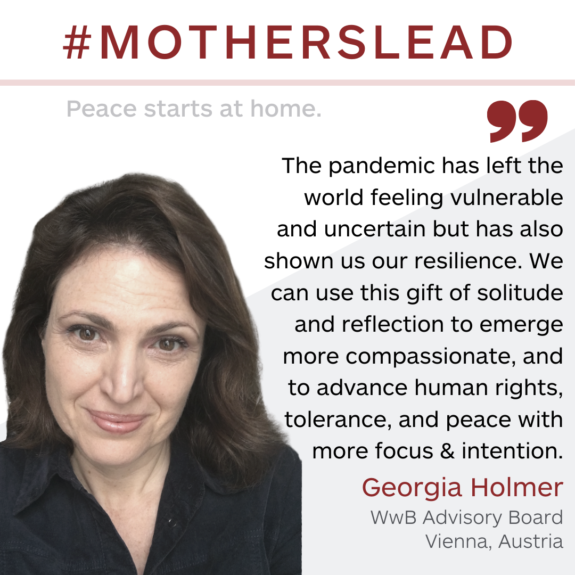
‘The pandemic has left the world feeling vulnerable and uncertain but has also shown us our resilience. We can use this gift of solitude and reflection to emerge more compassionate, and to advance human rights, tolerance, and peace with more focus and intention.’
– Georgia Holmer | Women without Borders Advisory Board Member, Vienna, Austria
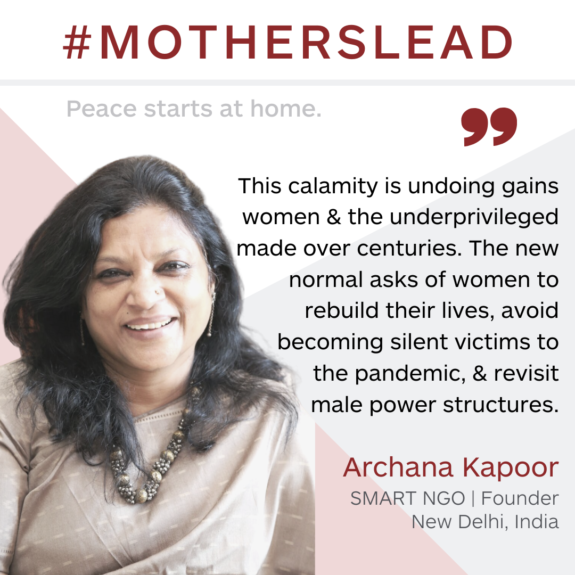
‘COVID-19 is not only a health pandemic but a social and economic catastrophe. This calamity is undoing gains women & the under-privileged made over centuries. The new normal asks of women to rebuild their lives, avoid becoming silent victims to the pandemic, and revisit male power structures. … Lockdown that many societies have imposed, is so masculine in construction & implementation. We have seen the blunt edge of the state being used to enforce a lockdown unmindful of how women will deal with the enormous burden that is falling on their shoulders. Many of them have been forced to give up their jobs to tend to the old and children, cook food and do all the household work, and as it happens in a country like India, to walk shoulder to shoulder with their husbands and children to return to their villages, at times 1000s kms away. And then there’s been the fearful spike in domestic violence women have to bear silently in lockdown homes, forced to live with their perpetrators. There is no one to listen to their cries as the police is busy with surveillance of lockdown, the helplines are dysfunctional on account of mobility for only “essential services” and shelter homes have been evacuated. Lockdown and after present new challenges to women and they would soon have to organise and mobilise to protect their rights that they have earned after years of hard struggle. Surely they have the courage, strength and resilience to not just fight the disease and protect themselves and their families, but to ensure that the new normal that the pandemic has created does not throw them back to dark ages. Women have to come together and lead from the front.’
– Archana Kapoor | New Delhi is a community broadcaster, filmmaker, and the founder & chair of the NGO Seeking Modern Applications for Real Transformation (SMART)
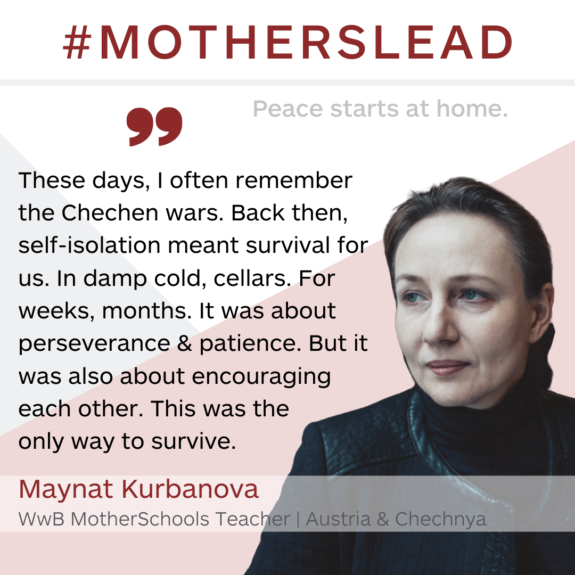
‘These days, I often remember the Chechen wars. Back then, self-isolation meant survival for us. In damp cold, cellars. For weeks, months. It was about perseverance & patience. But it was also about encouraging each other. This was the only way to survive.’
– Maynat Kurbanova | WwB MotherSchools Teacher, Chechnya & Austria
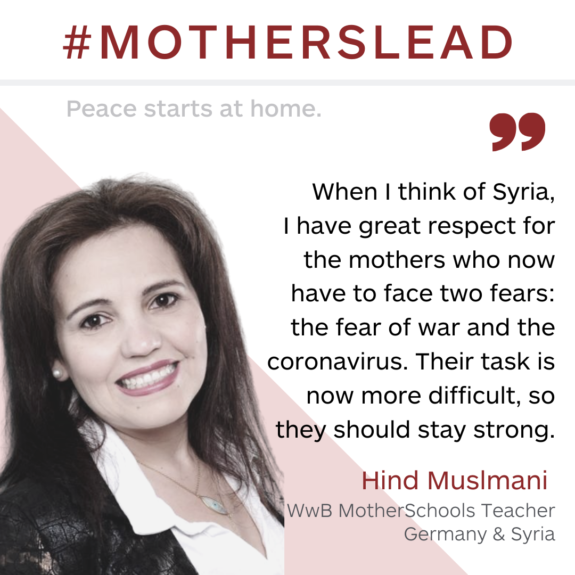
‘We are facing a major challenge that we will all master together. When I think of Syria, I have great respect for the mothers who now have to face two fears: the fear of war and the coronavirus. Their task is now more difficult, so they should stay strong. We also have to stay strong, to stay united—instead of side-by-side—to master this situation.’
– Hind Muslmani | from Syria, living in Augsburg, is a WwB MotherSchools Germany Teacher
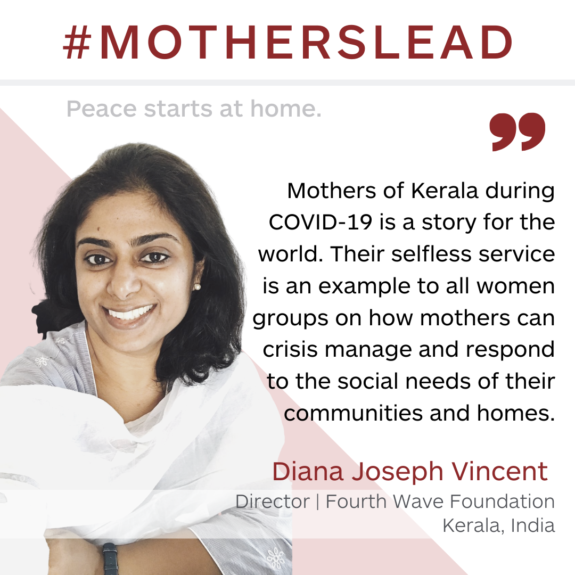
‘Mothers of Kerala during COVID-19 is a story for the world. Their selfless service is an example to all women groups on how mothers can crisis manage and respond to the social needs of their communities and homes. … Kerala is to be greatly lauded for its proactiveness in managing the COVID-19 crisis and effective lockdown. Commendable is the network of women who have been engaged in providing necessary services during these tough times. The story is about ordinary women of the KUDUMBASHREE movement extending their services to the state during these COVID times. Kerala, along with Pondicherry, are the only Indian states to have a female-to-male ratio higher than the national figures. One evening I received a call from a woman enquiring about the elderly at my home, their welfare and medical needs informing that there might be an extended lockdown and we need to consider stocking up. As much as I was worried about such data in public hands, I was amazed to find out that this union of women around the state have been given the responsibility of care for the elderly. This example of the power of women, often mothers who are home makers and not professionals are playing a key part in supporting the state bodies. … I hope that we are able to look at this current situation as an opportunity to leave a powerful message for our kids and loved ones. This too will pass and when it is all beginning to look better and we are able to put this behind, one person that will live in the memories of the kids, families & community will be the selflessness of the beautiful creation of God: the women, the mother. … As a self-taught artist it’s beautiful to let my children explore and learn art and painting without conditioning. We’ve also found the time to slow down and enjoy the simple things of life. We see lots more birds now, either we never noticed them before due to all the distractions of life or there are actually more birds now because of the quiet. Looking back, I wonder how much more we’ve missed to learn from life and everything around us.’
– Diana Joseph Vincent | Director at Fourth Wave Foundation, Kerala, India
You are currently viewing a placeholder content from YouTube. To access the actual content, click the button below. Please note that doing so will share data with third-party providers.
‘I understood, from a lifetime of painting and a lifetime of teaching other people about how they could be better artists, that most of it is about confidence. I think I learned a lot of this from my mother, who is a textile designer and who never for a moment told me that I couldn’t be an artist. Never for a moment wondered how on earth was I going to make a living being an artist. I think she hoped that I would change my mind but she never told me to change my mind. Every other weekend when I was a very small child we would go to big and beautiful department stores in London and we would look at wonderful fabrics, wonderful dresses, wonderful furniture. She taught me how to understand the beauty of things and the quality of things … Then on the alternative weekend we would go to the big museums of London, and look at paintings, look at objects, go to the V&A, understand again about beautiful clothes, wonderful fabrics, fantastic paintings, and the history of art.’ [For video, click here]
– Lubaina Himid | Turner Prize-Winning Artist, London, UK
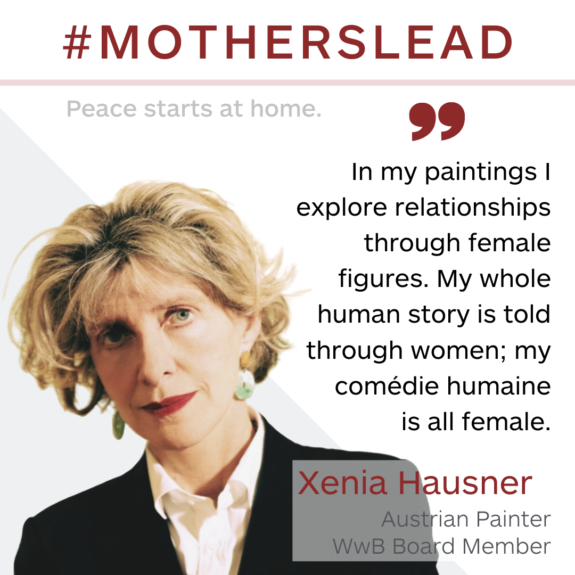
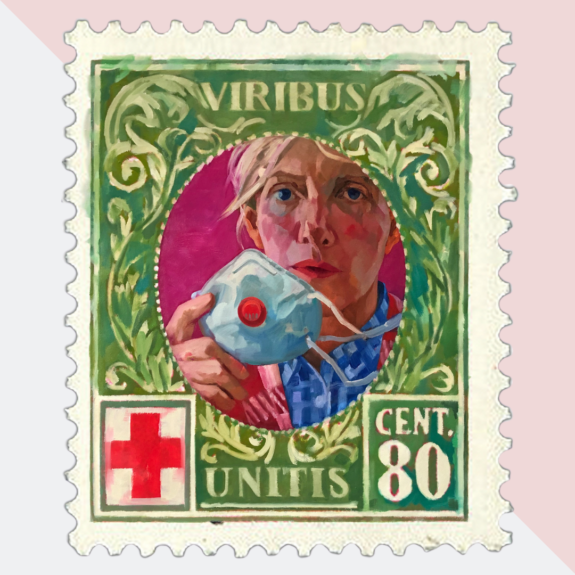
‘In my paintings I explore relationships through female figures. My whole human story is told through women; my comédie humaine is all female.’
– Xenia Hausner | Austrian Painter, WwB Board Member
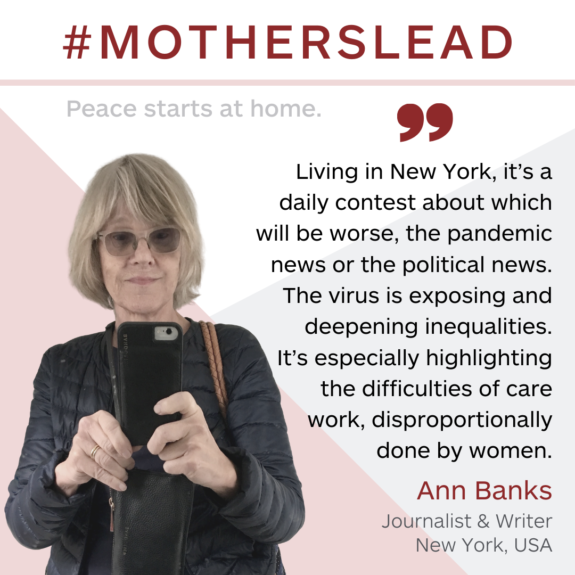
‘Living in New York, it’s a daily contest about which will be worse, the pandemic news or the political news. The virus is exposing and deepening inequalities. It’s especially highlighting the difficulties of care work, disproportionally done by women. At the same time, there’s a glimmer of possibility that this could be a turning point, and that the pandemic might lead to positive change. We can hope that our collective trauma might foster the will to build a fairer and more just society. Women’s leadership will be important in this endeavor. We have many feisty women leaders in this country – judges, governors, congresswomen — and we have never needed them more. It’s crucial to the future of my city and my country that their voices are heard.’
– Ann Banks | journalist & writer from New York, USA
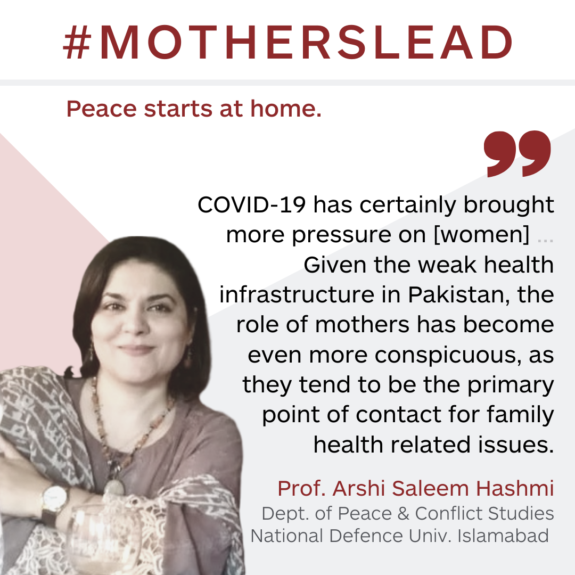
‘Irrespective of whether women work full time or stay at home, COVID-19 has certainly brought more pressure on them. Mothers in particular face added stress while dealing with multiple roles for their families. But that does not deter them from putting a smile on their face so their family does not feel down. From morning till evening, women make sure that they continue to uplift the spirit of their loved ones with zest and energy. In countries like Pakistan, with conservative family structure, already many social inequalities exist but COVID-19 has further increased the responsibilities for women to have their kids focus on studies during school closure, to keep their husbands positive about work and income and to take care of elderly in-laws. Given the weak health infrastructure in Pakistan, the role of mothers has become even more conspicuous, as they tend to be the primary point of contact for family health related issues. We have societal expectations for women that are still very hard to change. Any health crisis at home is managed by women, gender roles are still very conservative and predefined in most families. Nevertheless, Pakistani mothers continue to shoulder that responsibility with resilience and dedication with a hope for better tomorrow.’
– Prof. Arshi Saleem Hashmi | Department of Peace & Conflict Studies, National Defence University, Islamabad
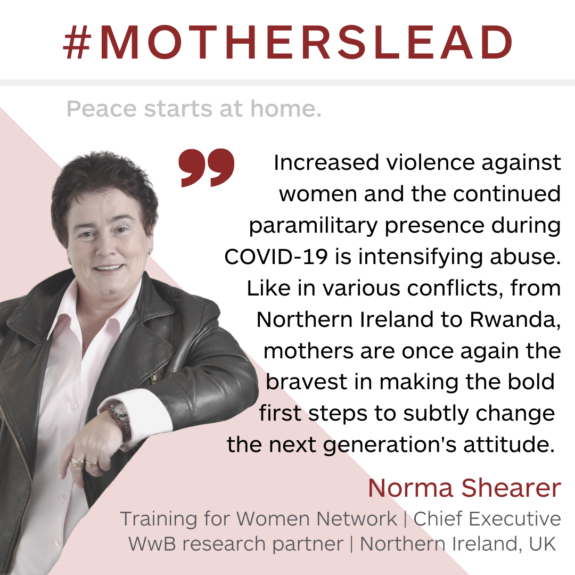
‘This crisis has put even more pressure on Mothers. Increased Violence Against Women and the continued paramilitary presence during COVID-19 is intensifying abuse. Like in various conflicts, from NorthernIreland to Rwanda, mothers are once again the bravest in making the bold first steps to subtly change the next generation’s attitude. Mothers are not just at the heart of families, but also at the heart of communities and society. Young or old, they are the predominant vehicle for caring and teaching, they are uniquely placed to influence and direct society in ways that are ignored by political elites and the hegemonic power structures that currently prevail. When women and mothers unite, the resulting change affects all of society. When you educate a woman, you educate a family, and when you educate a family, you educate a community. When mothers come together, the education and learning that takes place cascades out, creating greater change. … At the Training for Women Network (TWN), we have taken this understanding and embedded the importance of the role mothers play in leading to change in all of our projects. Mothers’ roles in combatting radical extremism is inbuilt in all of our peace and reconciliation work, reflecting the unique role mothers can play in directing young people away from paramilitaries and their activities and wider world views on the role of violence. Mothers’ involvement also helps to shatter traditional gender roles within patriarchal societies and empowers girls and young women. … TWN encourages all mothers to embrace and express the agency and power they have at their fingertips. To affect positive and lasting change, mothers must be at the forefront of campaigns for change. This is why TWN proudly supports the MothersLead campaign. Only by supporting this kind of work by organisations like Women without Borders and TWN can we eradicate violence, extremism and effect this change on a global scale for the benefit of all.’
– Norma Shearer | Chief Executive at Training for Women Network (TWN) in Northern Ireland, UK & WwB research partner
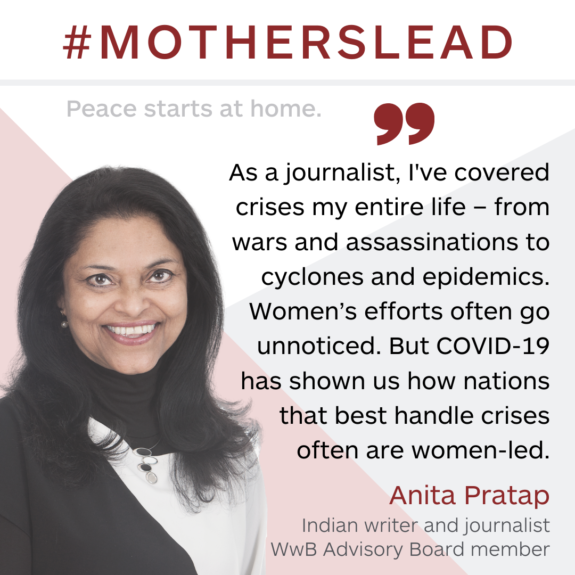
‘As a journalist, I’ve covered crises my entire life – from wars and assassinations to cyclones and epidemics. Women’s efforts often go unnoticed. But COVID-19 has shown us how nations that best handle crises often are women-led, like in cases of Germany, Norway, NewZealand, & Finland. … Mothers have some universal qualities that make them ideally suited to handle crises. They can multi-task, they prepare for the worst, they listen, they are empathetic and resilient, quickly doing what they can to preparing for the future. Some years ago, an earthquake had devastated Latur village in India, killing over 10,000 people. A day after the disaster, the men had somehow got hold of illicit liquor and were drunk. The women were patiently sifting through the ruins of their house, pulling out whatever intact items they could find. Done with grieving, their minds had moved on, focusing on feeding their families, taking small but specific steps to rebuild their lives.’
– Anita Pratap | Indian writer and journalist, WwB Advisory Board member
‘I am Sabina Smailovic, I work as a doctor, specialising in paediatrics and family psychotherapy. I am also very passionate about parenting and peace building through it and that is how I became involved in MotherSchools and Women without Borders. Because of social distancing we were forced to turn to each other. We couldn’t use other people or activities as a distraction from the challenges we face sometimes in our family life so there was the possibility and time to reorganize and find solutions. We also needed a comfort and sense of security that we found in our home. The time we are spending locked up doesn’t have to be an unexpected vacation, time to start a business, write a book, improve our skills… It is ok if we are struggling, these are difficult times. It is enough to take care of ourselves, physically and emotionally and focus on surviving and protecting the others having in mind that this too shall pass. ‘Most of all I am afraid that the world will not go back to normal as it was before or it will go back without learning from this and change for the better. … That the civil liberties and laws are so fragile, they can change in a minute if we are facing a threat. Technology cannot replace human interactions. I have one child at the age of 3. It was challenging not having the help of a Daycare or grandparents. It was up to us, the parents to provide the activities and education all the time while being anxious and scared over the news. I am very concerned in what kind of world are we living and what kind of world are we leaving to the next generations. The threats we as mothers are facing may be different but the way about is the same through understanding, consideration, support and hard work.’
– Sabina Smailovic | Medical Doctor in Skopje & WwB MotherSchools Teacher
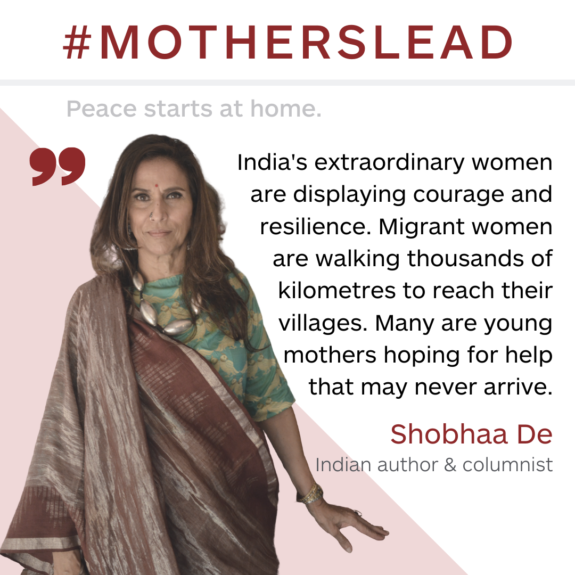
‘India’s extraordinary women are displaying courage and resilience. Migrant women are walking thousands of kilometres to reach their villages. Many are young mothers hoping for help that may never arrive. Some of these women have very young children trudging without food or water in the extreme heat. Some are pregnant. Some are sick. And yet, they trudge on, often on empty stomachs and carrying heavy bags. We salute our migrants for not giving up!’
– Shobhaa De | Indian author & columnist
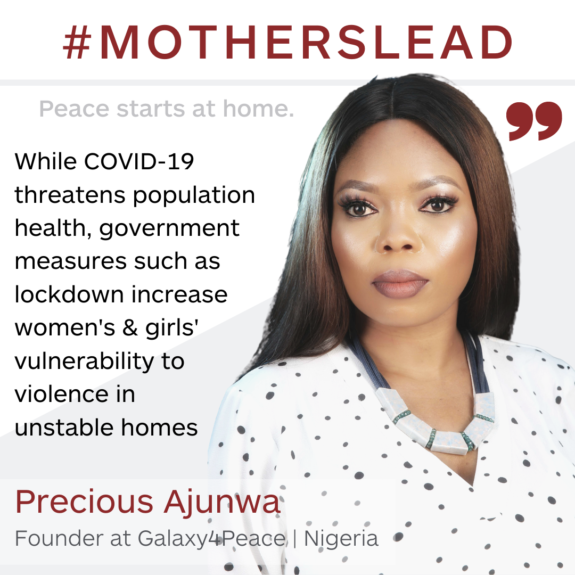
‘While COVID-19 threatens population health, government measures such as lockdown increase women’s & girls’ vulnerability to violence in unstable homes. However, an informed and empowered leading woman in a home makes a difference in ending gender-based violence, by encouraging victims to speak up, scale up public awareness campaigns, particularly those targeted at men and boys to discourage violence against women, and warning of the punitive consequences of violence in homes and communities. Women are the stakeholders in bringing peace. … If you want sustainable peace you must begin with the family, because family peacebuilding is the foundation to world peace. And who are the stakeholders in families? Mothers!’
– Precious Ajunwa | Founder at Galaxy4Peace, Lagos, Nigeria
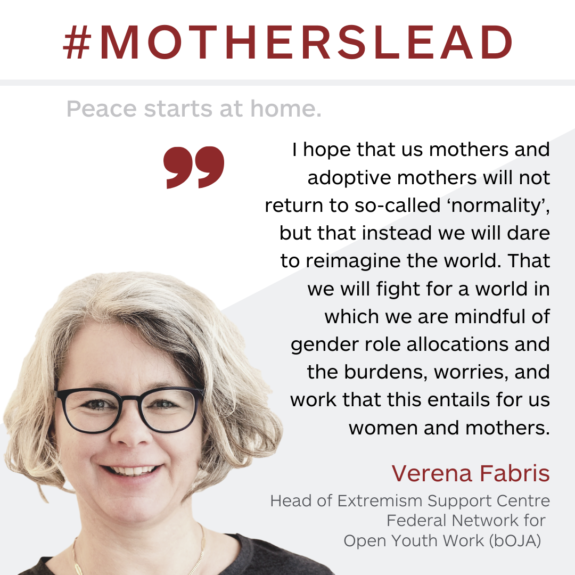
‘I hope that us mothers and adoptive mothers will not return to so-called ‘normality’, but that instead we will dare to reimagine the world. That we will fight for a world in which we are mindful of gender role allocations and the burdens, worries, and work that this entails for us women and mothers. A world in which our children do not fall into the trap of extremist groups because they think to find there what they lack elsewhere: closeness, community, someone listening to them, appreciation. A world in which we all—mothers, fathers, grandmothers, grandfathers, aunts, uncles, adoptive mothers, co-mothers, and non-mothers—care for each other, our environment, and the well-being of our children.’
– Verena Fabris | Head of Extremism Support Centre, Bundesweites Netzwerk Offene Jugendarbeit (bOJA; ‘Federal Network for Open Youth Work’), Vienna, Austria
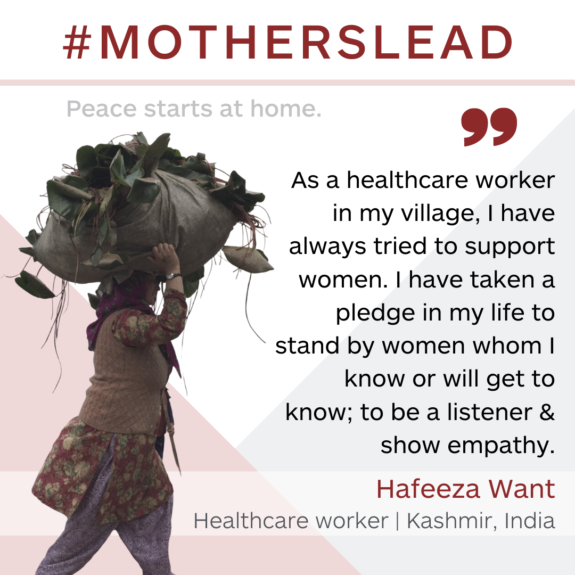
‘As a healthcare worker in my village, I have always tried to support women. I have taken a pledge in my life to stand by women whom I know or will get to know; to be a listener & show empathy. … As a mother, one should not feel guilty for not being able to meet all the demands of our children that they expect from us. We have always tried our best and should be proud of our efforts and not taking too much unnecessary pressure which is not in our control. … My family members are daily wage workers–be it in construction, handicrafts, or vegetable selling. If we miss any workday, that means we cannot earn that day, which is actually happening nowadays.’
– Hafeeza Want | Healthcare worker from Kashmir, India
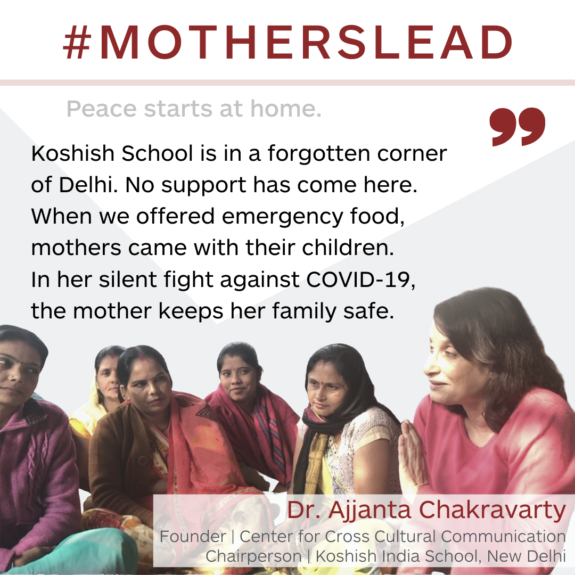
‘Koshish School is in a forgotten corner of Delhi. No support has come here. When we offered emergency food, mothers came with their children. In her silent fight against COVID-19, the mother keeps her family safe. That matters. Today marks 45 days of lockdown in India. The Koshish team reached out to families with 1.5 quintals of emergency food rations thrice in these 45 days. There has not been a single COVID positive case in New Priyanka Camp. Its physical isolation helped. I believe the role of mothers in keeping their families engaged and fed has contributed a lot. Most of the population are migrant labour daily wage workers. Koshish school has been working with the children and mothers in this community for twenty years. Our biggest lesson learnt: Mother is the resilient bamboo around which the family flourishes. With zero income opportunity during lockdown, most men did not wish to stay in Delhi. They wanted the whole family to trek back to their villages, thousands of miles away. The mothers were the Voice of Reason during this time, counselling and persuading against rash decision making. When Koshish teachers started online classes on March 23, the mothers supported us. Many families had only one smartphone, that of the father. Initially many fathers would not share their phones but over a fortnight, the number of students joining online increased substantially. Once again, it was the mother who enabled the change. She understood what was important–the need to maintain continuity of learning. … In a forest, there are many impressive trees. The Bamboo appears nondescript in comparison. However it is the only one with immense resilience and it does not block sunlight from those in need. A whole family of plants can flourish around a bamboo because it focuses on “what is important”…. Share and Grow. Not Grab and Grow. That is the Mother.’
– Dr. Ajjanta Chakravarty | Founder of Center for Cross Cultural Communication & Chairperson at Koshish India School, New Delhi, India
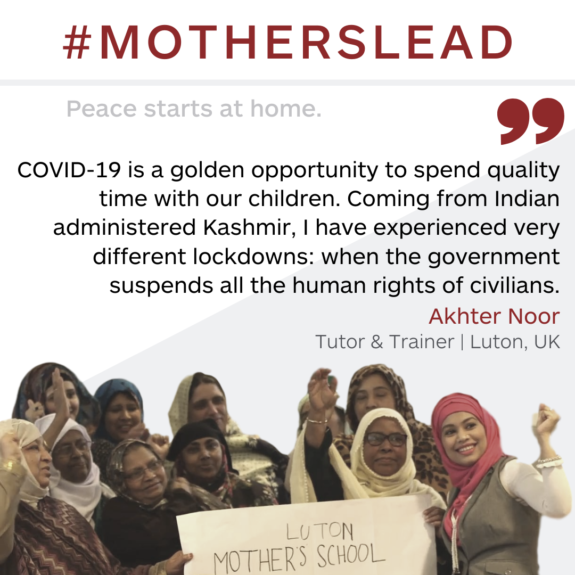
‘COVID-19 is a golden opportunity to spend quality time with our children. Coming from Indian-administered Kashmir, I have experienced very different lockdowns: when the government suspends all the human rights of civilians. So I have learned to stay calm in a crisis but couldn’t explain or transmit that experience properly to my children. This lockdown has made my job easy, my kids are able to appreciate what they have, they are staying calm and they stopped complaining about being bored. … I lost my job because of the lockdown which made me very sad, but with the passage of time I got used to a new routine of staying busy in home. My son usually loves to help me in cooking, but during the lockdown he has the mastered the skill of making dough, honestly speaking he has much better in it than me and more importantly he enjoys it, which makes me extremely happy. I cherish the moments when my children involve their dad completely in their games which was practically almost impossible earlier because of the time restraints. … I am afraid of fake news which pushes us into a dark world of uncertainty where we feel completely lost in utter confusion which makes us behave abnormally. … I come from Indian administered Kashmir, world’s highest militarized zone with 700,000 army men for a population of nearly 7 million people who live in a constant atmosphere of fear and intimidation. I came to U.K. 12 years ago, but growing up in a conflict zone has made me a person who always feels the pain and suffering of oppressed people, so I always want to work for the restoration of their human rights.’
– Akhter Noor | Tutor & Trainer in Luton, England, UK
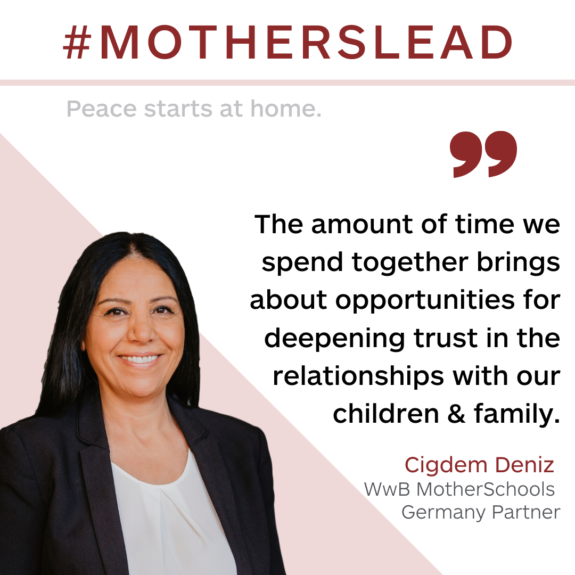
‘Dear mothers: Our children are just as afraid as we are now. Not only can they hear everything that is going on around them; they also feel our constant anxiety and fear. Our children have never experienced anything like this. Although the idea of not going to school for weeks sounded great at first, they probably imagined that this would be a fun time like a summer vacation—not the reality of being trapped and isolated at home. In this isolation, living so tightly together can cause friction more quickly. The amount of time we spend together brings about opportunities for deepening trust in the relationships with our children and family.’
– Cigdem Deniz | WwB MotherSchools Germany Partner, Aschaffenburg
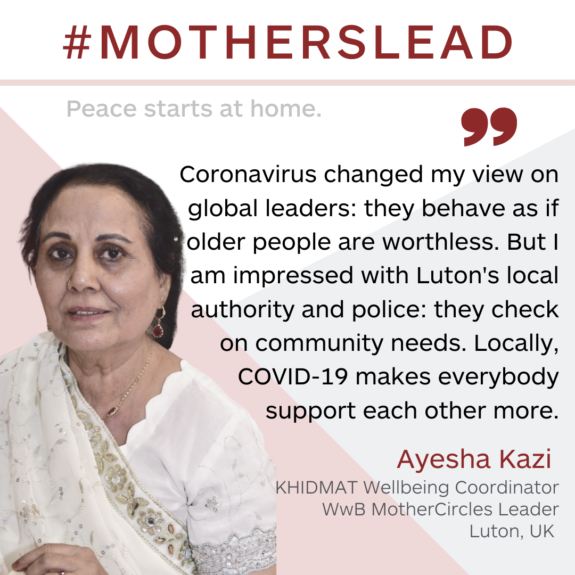
‘Many close family friends passed away. I feel miserable and worried about family and friends. Corona virus changed my view on global leaders: they behave as if older people are worthless. But I am impressed with Luton’s local authority and police: they check on community needs. Locally, COVID-19 makes everybody support each other more. … Born and brought up in India in the atmosphere of religious conflicts between Hindus and Muslims. My grandmother had a large women’s wellbeing art & craft centre in India. I started voluntary work in the UK due to my childhood memories. I do respect British values. … My fear is that our lockdown may continue to the next year because in the winter conditions the virus attacks will get worse. Inoculation against COVID-19 is still being researched. 2021 will be a new world. … I believe all mothers love their children. It is hard to keep younger ones in the house for long especially in flats. It is a big test of their patience and also a big decision to take, e.g. whether or not to take them out. Taking children out could be dangerous. It is very important that mothers look after their own health too. They are the main pillars to support their family.’
– Ayesha Kazi | KHIDMAT Wellbeing Coordinator, WwB MotherCircles Leader, Luton, UK
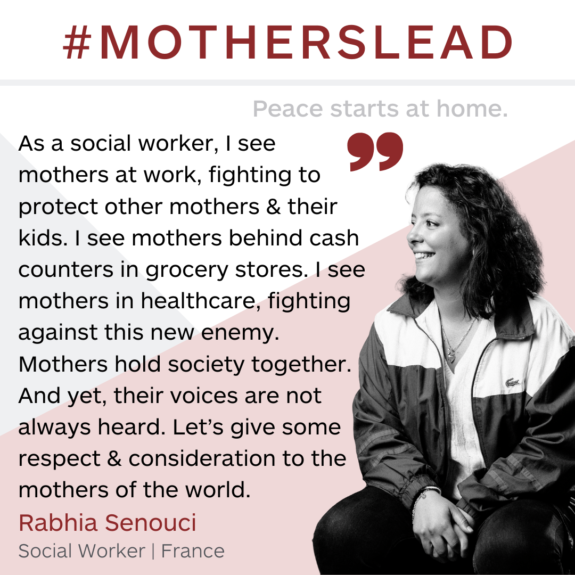
‘Mothers are the backbone of society: they give birth, they support families and friends, they also try to fit in professionally. We see them, on our day to day basis, we see them even more during those circumstances. As a social worker, I see mothers at work, fighting to protect other mothers & their kids. I see mothers behind cash counters in grocery stores. I see mothers in healthcare, fighting against this new enemy. Mothers hold society together. And yet, their voices are not always heard. These circumstances are all about self-reflection and “new normal”: as a start, let’s give some respect and consideration to the mothers of the world. None of us would be here if it was not for them.’
– Rabhia Senouci | Social Worker, France
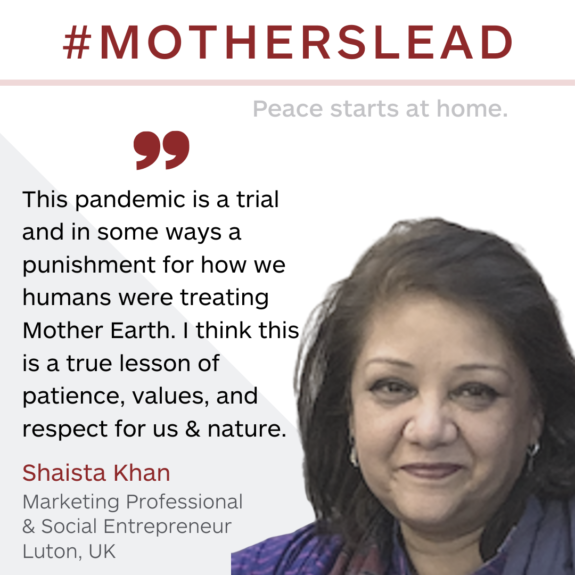
‘This pandemic is a trial and in some ways a punishment for how we humans were treating Mother Earth. I think this is a true lesson of patience, values, and respect for us and nature. … I am the eldest of six who raised her siblings after the early death of my parents. I got married at 44 to a man with 2 young children. A Pakistani born, Australian citizen who grew up in Middle East and is now a British citizen, I have worked on social programs in Pakistan and with migrants & refugees in Australia and UK. I like to support people specially migrants in settling in a new environment. I also do this via my Facebook group “Women Immigrants Support Group” which has members of all ethnicities from around the world.’
– Shaista Khan | Marketing Professional & Social Entrepreneur, Luton, UK
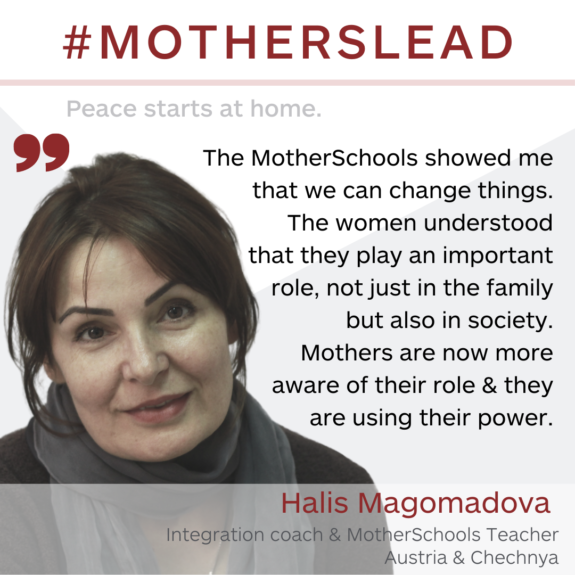
‘The MotherSchools showed me that we can change things. The women understood that they play an important role, not just in the family but also in society. Mothers are now more aware of their role & they are using their power.’
– Halis Magomadova | Integration coach & MotherSchools Austria Teacher, from Chechnya living in Austria
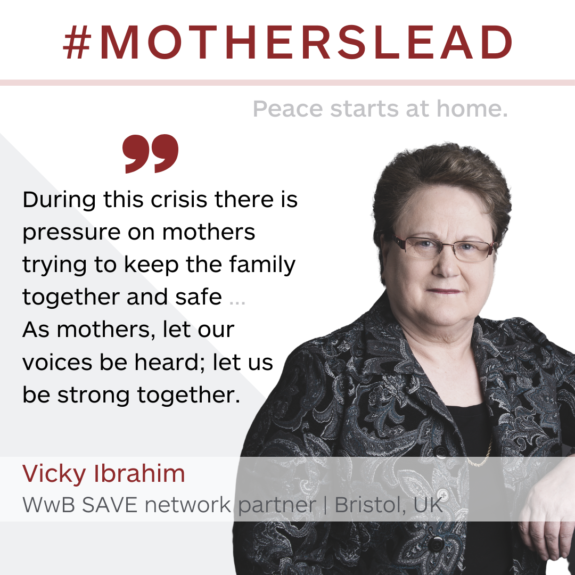
‘During this crisis there is pressure on mothers trying to keep the family together and safe. Sadly, there has been an increase in domestic abuse which children may have witnessed. This can be a very challenging time for all, including the uncertainty of when it will end. We can get through this by supporting one another. This can be a traumatic time for mothers who are currently not allowed to visit children in prison. As mothers, let our voices be heard; let us be strong together. Mothers are at the very centre of the home and can effect changes. We will come through this!’
– Vicky Ibrahim | member of WwB’s Sisters Against Violent Extremism (SAVE) network, Bristol, United Kingdom
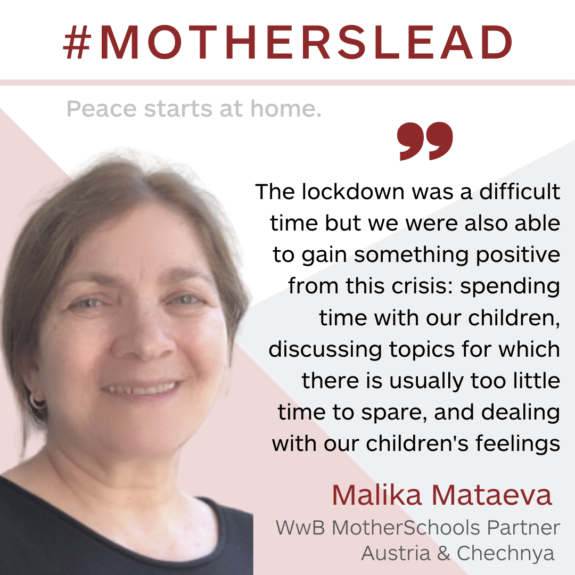
‘The lockdown was a difficult time but we were also able to gain something positive from this crisis: spending time with our children, discussing topics for which there is usually too little time to spare, and dealing with our children’s feelings’.
– Malika Mataeva | from Chechnya, living in Austria, is a WwB MotherSchools Austria Partner

‘I learned a lot from COVID-19, like to appreciate freedom. We have taken everything we can do for granted: travel, shopping, and much more. Suddenly we all had to stay at home with our children. Only then did we realise that there can be something that takes away our freedom. This period was a burden for many mothers. There have been many cases of domestic violence, as the authorities here also say, and the helplines for women were overloaded. I am concerned that the violence will increase. But when the men go back to work or the women, maybe everything will be back to normal. I don’t know if everyone can overcome this crisis, this fear—many will struggle with mental problems. I appreciate life, I’ve learned that you don’t need that much for life.’
– Nilüfer Ulusoy | WwB MotherSchools Germany Partner in Erlenbach/Main Bavaria
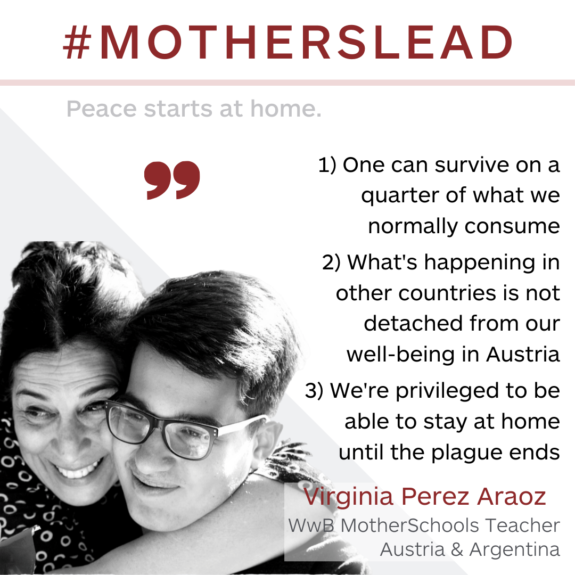
‘I am Virginia, mother of five children, and the quarantine caught me at home with three of them (16, 18, and 24 years old). Apart from the uncertainty of what our life will look like following quarantine, these days are proving very rewarding for my family. When communicating with my children, I decided to focus almost exclusively on these three aspects:
1) One can survive on a quarter of what we normally consume.
2) What is happening in other countries is not detached from our well-being in Austria.
3) We are privileged to be able to stay at home until the plague ends. In our world, quarantine is privilege.’
– Virginia Perez Araoz | WwB MotherSchools Austria Teacher, Argentinian living in Graz, Austria
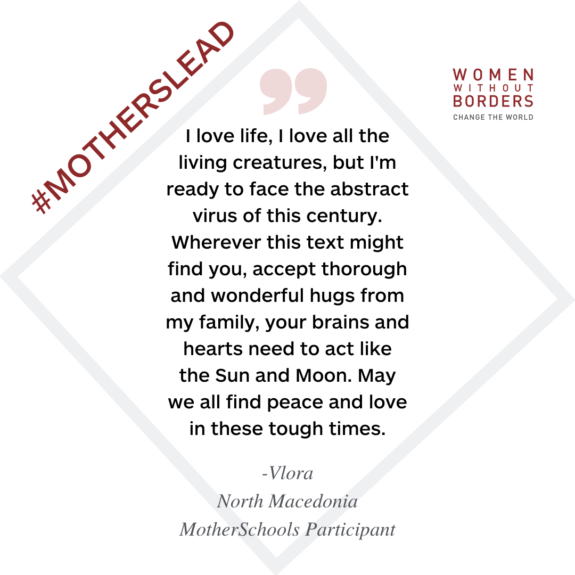
‘Self isolation is the preventative measure us citizens can take for the better being of all of us… I love life, I love all the living creatures, but I’m ready to face the abstract virus of this century. Wherever this text might find you, accept thorough and wonderful hugs from my family, your brains and hearts need to act like the Sun and Moon. May we all find peace and love in these tough times.’
– Vlora | North Macedonia WwB MotherSchools Participant
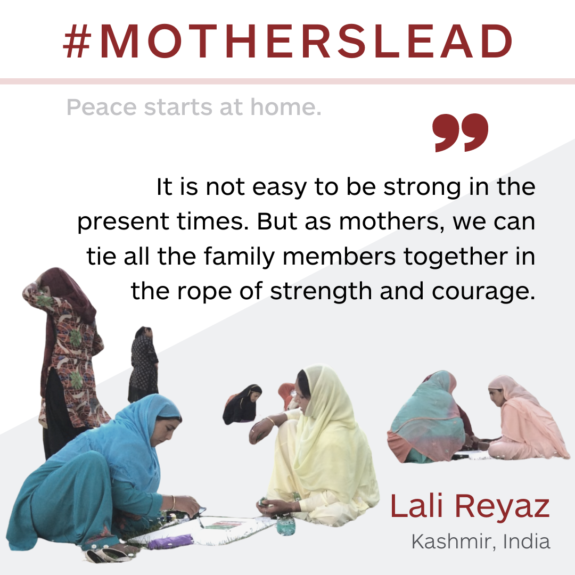
‘It is not that easy to be strong in the present times. But, as mothers we must tie all the family members together in the rope of strength and courage…I have two children. It is not that easy to manage things now. Besides, struggling with the limited available food, it gets very difficult to counsel children with positive thoughts and hope for tomorrow. We are so afraid about things ourselves that we have been very weak…I think it has taught all of us that how much we must value all our blessings in life without complaining all the time for the things which are not in our control.’
– Lali Reyaz | Kashmir, India MotherSchools Participant


